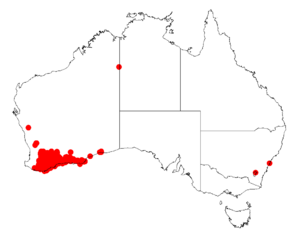Acacia sulcata facts for kids
Quick facts for kids Acacia sulcata |
|
|---|---|
| Scientific classification |
|
| Kingdom: | Plantae |
| Clade: | Tracheophytes |
| Clade: | Angiosperms |
| Clade: | Eudicots |
| Clade: | Rosids |
| Order: | Fabales |
| Family: | Fabaceae |
| Clade: | Mimosoideae |
| Genus: | Acacia |
| Species: |
A. sulcata
|
| Binomial name | |
| Acacia sulcata |
|
 |
|
| Occurrence data from AVH | |
| Script error: The function "autoWithCaption" does not exist. | |
Script error: No such module "Check for conflicting parameters".
Acacia sulcata is a type of shrub that belongs to the Acacia family. It's special because it only grows in a certain part of southwestern Australia. This plant is sometimes called a "wattle" in Australia.
What it Looks Like
This shrub usually grows to be about 0.2 to 2 meters tall, which is roughly 8 inches to 6.5 feet. It tends to spread out, making it look bushy. Its branches can be very smooth (this is called glabrous) or have tiny hairs. Sometimes, the tips of the branches look like they're covered in a fine white powder.
Instead of regular leaves, Acacia sulcata has something called phyllodes. These are like flattened leaf stems that do the job of leaves. They are shaped like cylinders or taper (get narrower at one end). They can be straight or slightly curved, usually 5 to 25 millimeters long (that's less than an inch!) and 1 to 2 millimeters wide. They have six or seven clear lines, or "nerves," on them.
When this plant blooms, it's from June all the way to February. It produces bright yellow flowers. These flowers grow in small, round clusters, usually one or two clusters in the spot where a leaf (or phyllode) meets the stem (this spot is called the axil). Each flower cluster is about 3 to 4 millimeters across and has 10 to 15 golden flowers.
After the flowers, thin, leathery or papery seed pods form. These pods are smooth and sometimes have a fine white powdery coating. They are long and can be wavy, growing up to 3.5 centimeters long and 2 to 4 millimeters wide. Inside these pods are seeds that can be mottled grey, black, or brown. They are shaped like wide ellipses or ovals.
Different Types
There are three slightly different kinds, or varieties, of Acacia sulcata:
- Acacia sulcata var. planoconvexa
- Acacia sulcata var. platyphylla
- Acacia sulcata var. sulcata
Where it Grows
Acacia sulcata is found naturally in certain areas of Western Australia. These areas include the Great Southern, Goldfields-Esperance, and Wheatbelt regions.
You can often find this plant growing near granite rocks, on rolling plains, or on rocky ridges, hills, and rises. It can grow in many different types of soil, including gravelly laterite (a type of reddish soil), sandy soil, clay, or loamy soil. The plant's range stretches from around Corrigin in the northwest, down to Albany in the southwest, and then eastward along the coast or near the coast to places like Israelite Bay.
 | Delilah Pierce |
 | Gordon Parks |
 | Augusta Savage |
 | Charles Ethan Porter |

